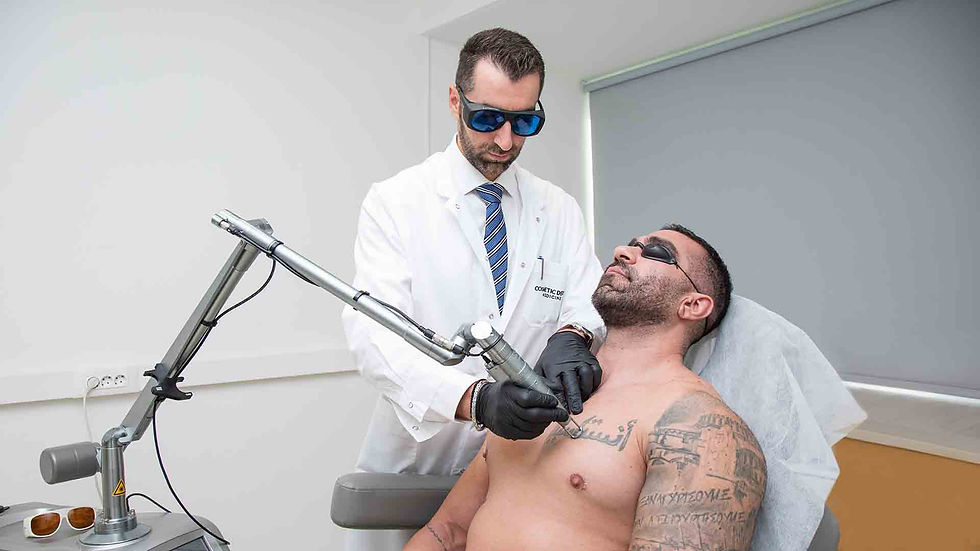Laser Tattoo Removal Clear Your Skin, Clear Your Mind
- danyalmalikdynamic
- Aug 23, 2024
- 4 min read
Tattoos have long been a form of personal expression, but for many, what was once a symbol of identity can become a source of regret. Whether due to changing tastes, personal growth, or lifestyle changes, the decision to remove a tattoo can be as significant as the decision to get one. Laser Tattoo Removal in Dubai has emerged as a leading method for those seeking a clean slate. This article explores the process, benefits, and considerations of laser tattoo removal, helping you make an informed decision.
What is Laser Tattoo Removal?
Laser tattoo removal is a medical procedure that uses high-intensity light beams to break down the ink particles in a tattoo. These particles are then absorbed and removed by the body's immune system. The process targets the tattoo pigment without damaging the surrounding skin, making it a popular choice for those looking to erase unwanted tattoos.

How Does It Work?
Laser tattoo removal works through a process known as selective photothermolysis. This technique involves delivering short bursts of laser light at specific wavelengths that are absorbed by the tattoo ink. The ink particles absorb the laser light and fragment into smaller pieces, which are subsequently cleared by the body’s lymphatic system.
Types of Lasers Used
Q-Switched Lasers: These lasers are commonly used in tattoo removal due to their ability to deliver short, intense bursts of light. They are effective for breaking down different colors of tattoo ink.
Picosecond Lasers: A more advanced option, picosecond lasers deliver even shorter pulses than Q-switched lasers. They offer potentially fewer sessions and less damage to the surrounding skin.
Nd Lasers: These are particularly effective for dark colors like black and blue. They penetrate deeper into the skin to target the ink more effectively.
Ruby Lasers: These are effective for red and black inks but are less commonly used today due to advancements in other laser technologies.
The Benefits of Laser Tattoo Removal
Effective and Safe
Laser tattoo removal is known for its effectiveness in breaking down various colors of ink and its relatively high safety profile. It minimizes damage to the surrounding skin and is less invasive compared to other methods like surgical excision or dermabrasion.
Minimal Downtime
One of the key advantages of laser tattoo removal is its minimal downtime. Most patients can resume their normal activities shortly after treatment, though there may be some temporary redness and swelling.
Customizable Treatment
The technology behind laser tattoo removal allows for customized treatment plans tailored to the specific type and color of the ink. This customization helps in achieving optimal results and reducing the number of sessions required.
Improved Results Over Time
Tattoo removal is a gradual process, and the results improve over time. Each session breaks down more of the ink, leading to a progressive fading of the tattoo. Patience and consistency are key to achieving the best outcome.
Considerations and Side Effects
Multiple Sessions Required
Complete removal of a tattoo usually requires multiple sessions. The number of sessions depends on various factors, including the tattoo’s size, color, depth, and the type of ink used. On average, it may take 5 to 15 sessions to fully remove a tattoo.
Possible Side Effects
While laser tattoo removal is generally safe, there are potential side effects to be aware of. These include:
Redness and Swelling: Common and temporary, usually subsides within a few days.
Blistering: May occur as the skin heals. It’s important to avoid picking at blisters to prevent scarring.
Hyperpigmentation or Hypopigmentation: Changes in skin color can occur, particularly in individuals with darker skin tones.
Scarring: Though rare, some individuals may experience scarring. Following post-treatment care instructions can minimize this risk.
Aftercare and Recovery
Proper aftercare is crucial for achieving the best results from laser tattoo removal. Following the treatment, patients should adhere to the following guidelines:
Keep the Area Clean: Gently cleanse the treated area with mild soap and water. Avoid using harsh scrubs or chemicals.
Apply Moisturizer: Use a soothing, non-scented moisturizer to keep the skin hydrated and promote healing.
Avoid Sun Exposure: Protect the treated area from direct sunlight to prevent pigmentation changes and skin damage.
Avoid Picking or Scratching: Let any blisters or scabs heal naturally to reduce the risk of scarring.
Follow Up with Your Practitioner: Attend all scheduled follow-up appointments to monitor progress and address any concerns.
Emotional and Psychological Impact
Undergoing tattoo removal can have a significant emotional and psychological impact. For many, the decision to remove a tattoo is deeply personal and often tied to changes in their identity or life circumstances. The process of seeing the tattoo fade and eventually disappear can be both liberating and emotionally fulfilling.
A Fresh Start
Removing an unwanted tattoo can provide a fresh start and help individuals move forward with a clean slate. It can also alleviate the psychological burden of feeling self-conscious or uncomfortable about the tattoo.
Boost in Self-Esteem
Successfully removing a tattoo can boost self-esteem and confidence, contributing to an overall sense of well-being. It allows individuals to feel more aligned with their current self-image and life goals.
Conclusion
Laser tattoo removal offers a promising solution for those seeking to erase unwanted tattoos and clear their skin. With its ability to target specific ink pigments and minimal downtime, it provides a path to personal renewal and self-expression. While the process requires patience, multiple sessions, and a commitment to aftercare, the benefits of achieving clearer skin and a refreshed sense of self can be well worth the effort. If you’re considering tattoo removal, consulting with a qualified practitioner can help you understand the best approach for your specific needs and guide you on the journey to clear skin and a clear mind.

Comments